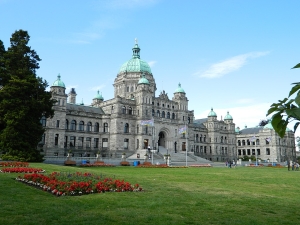Clean Energy Canada | Budget 2023 recognizes B.C.’s generational economic opportunity, but a clean industrial strategy is needed to realize it
February 28, 2023

OTTAWA — Mark Zacharias, executive director of Clean Energy Canada, made the following statement in response to the release of B.C.’s 2023 budget.
“B.C.’s new budget takes important steps toward transforming its economy to better compete in a cleaner, low-carbon world, though a clean industrial strategy remains the key piece missing to realize this vision.
“Budget 2023 nonetheless includes much-needed new investments over three years, including $480 million for skills training, $77 million to accelerate permitting, $180 million to support manufacturing, $40 million to drive the switch to zero-emission trucks, $1.1 billion to build more climate-resistant communities, and $100 million to make communities less dependent on cars.
“Ensuring that British Columbians can access essential skills training in a changing economy is not only fair to workers but key to our economic competitiveness—we cannot seize an opportunity without the workforce to match it. While the details of the Future Ready Plan will be critical, the funding allocated in Budget 2023 is a positive step forward.
“The budget also promises new rules for B.C.’s carbon price to align it with the federal government’s along with bigger rebates given to individuals and families. Revenues from carbon pricing are also used to maintain industry competitiveness and encourage new clean initiatives, while consistency with the federal policy provides businesses with simplicity and certainty.
“What’s missing, however, is a crystalized vision for what a sustainable economy looks like in B.C.—one that would be followed by a clean industrial strategy to see it happen. How will B.C. compete in a changing world, and how will this government support the industries that will be growing in 2040 and beyond?
“Our neighbours and competitors are acting right now to transform their economies. Ontario and Quebec are seizing battery and EV manufacturing opportunities, while the U.S. is reimaging its manufacturing and energy sectors with last year’s subsidy-laden Inflation Reduction Act.
“B.C. is starting from a strong position. The province is home to a robust cleantech sector (Burnaby has been called the “Silicon Valley of the hydrogen fuel cell”), the highest EV adoption rate in the country, and a long history of continent-leading climate policy, including North America’s first carbon price—which has been integral to B.C.’s clean energy success to date.
“This government now has a generational opportunity to move key industrial projects across the finish line in the next two years, setting B.C. on a path to a prosperous future while doing its part for the climate and workers. We look forward to working with this government to ensure B.C.’s full potential is realized.”
RESOURCES
Previous statement | B.C. mandate letters recognize the strategic importance of building a clean economy
Poll | British Columbians overwhelmingly see impact of climate change on province, but awareness of B.C.’s climate plan is low